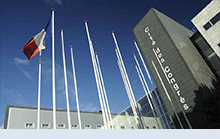 |
European Planetary Science Congress 2015
27 September – 02 October 2015
La Cité des Congrès, Nantes, France |
 |

Oral Program EX3
|
EX3 Formation and Dynamical Evolution of Planetary Systems |
| Co-Convener: Diego Turrini |
|
Oral Program
/ Tue, 29 Sep, 09:00–12:30
/ Room Neptune
Poster Program
/ Attendance Tue, 29 Sep, 17:45–19:15
/ Poster Area
|
|
Tuesday, 29 September 2015 Room Neptune |
|
| 09:00–09:15 |
EPSC2015-115
On the detectability of quasi-circular co-orbital planets. Application to the radial velocity technique. A. Leleu, P. Robutel, and A.C.M. Correia |
| 09:15–09:30 |
EPSC2015-121
Coorbital motion in the co-planar RTBP: family of Quasi-satellite periodic orbits A. Pousse, P. Robutel, and A. Vienne |
| 09:30–09:45 |
EPSC2015-143
On the rotation of co-orbital bodies p. Robutel, A. Leleu, and A. Correia |
| 09:45–10:00 |
EPSC2015-730
Evolution of angular-momentum-losing exoplanetary systems C. Damiani and A.-F. Lanza |
| 10:00–10:15 |
EPSC2015-449
Secular architecture of giant-planet dominated binary star systems A. Bazso, E. Pilat-Lohinger, B. Funk, and S. Eggl |
| 10:15–10:30 |
EPSC2015-322
Formation of giant planetary systems: effect of the eccentricity and inclination damping S. Sotiriadis, A.-S. Libert, B. Bitsch, and A. Crida |
|
Coffee break
|
|
| 11:00–11:15 |
EPSC2015-243
Asteroid flux and water transport towards circumprimary habitable zones in binary star systems D. Bancelin, E. Pilat-Lohinger, S. Eggl, H. Lammer, C. Johnston, T.I. Maindl, and R. Dvorak |
| 11:15–11:30 |
EPSC2015-434
Possible new members of Datura asteroid family A. Rosaev and E. Plavalova |
| 11:30–11:45 |
EPSC2015-646
Chemical composition of planets for different scenarios of formation of volatile species in the disc (withdrawn) U. Marboeuf, A. Thiabaud, C. Walsh, M. N. Drozdovskaya, C. Eistrup, E. F. van Dishoeck, Y. Alibert, and W. Benz |
| 11:45–12:00 |
EPSC2015-794
Extreme, variable debris disks produced by giant impacts during terrestrial planet formation A.P. Jackson |
| 12:00–12:15 |
EPSC2015-772
| presentation
The fossil Oort cloud and the dynamics beyond Neptune M. Saillenfest, M. Fouchard, G. Tommei, and G. Valsecchi |
| 12:15–12:30 |
EPSC2015-766
PRIME: Studying Low-Velocity Impacts in Microgravity J. Colwell, J. Brisset, A. Dove, A. Whizin, H. Nagler, and N. Brown |
